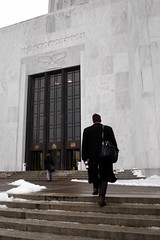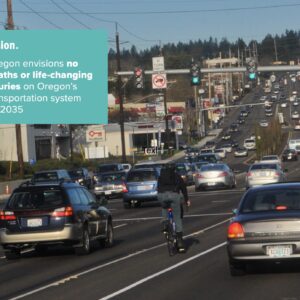Each legislative session the Bicycle Transportation Alliance (BTA) puts together a package of bike bills that they take to Salem and try and make into new laws. To help them create this package and establish their priorities, they rely not only on their own legislative committee, but on feedback from members and from the public.
The BTA’s new point man for pushing these bike bills is Government Relations Director Karl Rohde. This morning, Rohde posted a call for ideas on the BTA blog.
I know there are a lot of ideas out there for new laws to make biking safer and more accessible to all Oregonians — so now’s your chance to be heard.
Some ideas I’ve heard so far include; a “stops-as-yields” law, adding more bike safety information to driver’s tests (something our neighbors in Washington are working on already), a vehicular manslaughter law, improved laws to deal with road rage/intimidation of vulnerable road users, find new funding mechanisms for bike facilities (last year we tried to fund velodromes by using State Lottery funds), reduce residential speed limits, etc…
What new laws should the BTA (and all of us) work on in 2009?
For more information on bike laws and how the legislative process works, visit the BTA’s legislation page. You can also review their 2007 legislative package and results here.






While I think the stop signs as yield law is something that clearly makes sense for cyclists, I have a feeling that some group of auto-centrists will somehow connect it to something negative in their eyes, such as bikes being held to a double standard or something to that effect.
If such a bill were considered, I think we would have to be careful to promote it in the best possible light. Just look at Idaho—it\’s worked for them for years.
I hate to flog a dead horse, but this \’fixie\’ ticket thing needs to finally get fixed. It was really close last year. And for being considered a progressive city that law is embarrassing that is still out there.
I would love the stop as yield to happen, but that is an upward battle and a half. Most city cyclists do this anyways when it is possible and wont cause anyone any harm. Would it get abused if it became a legal right? Seems like it could end up in a very gray area to me, and the city/state has little motivation to allow this.
Possibly the best idea mentioned was driver AND cyclist education would be very beneficial at this point. Putting more cyclist information in driving tests would be one way that will impact drivers directly that they cannot get around. Other avenues of cyclist/drivers education should be looked at too. Speaking of education we need to get drivers to figure out how to use those new bike boxes that are going to be installed. About 50% of the time when a car is at the Clinton/39th intersection they are in the bike box and often about to take an illegal right turn on red.
The people blowing through stop signs in Portland have ensured that an Idaho stop-yield law will receive an unfavorable response in the Legislature.
Likewise, the downtown fixie riders skidding their back wheels to the side and otherwise demonstrating that they are barely able to control their bikes will do a lot to complicate efforts to fix the brake law.
Besides, there are much higher priorities. People are dying in the streets. Enhancing the safety of the roadways has to be job #1 in Salem.
#3 Actually a.O we had a pretty positive response when talking to legislators last year about the stop sign law. The law has actually passed in the house back in 2003 although it died in committee in the senate. There are many good reasons why an Idaho Style stop sign law should be passed in Oregon and support for such a change is growing.
Bjorn
Well Bjorn, I actually agree and that\’s good to hear. Obviously, the \”running stop signs\” thing is seized upon by every anti-bike zealot out there and I just hope that sentiment doesn\’t poison the effort to get what would be a useful change to the law.
I still think we\’ve got more important issues right now though – hopefully we won\’t have to make an either/or choice, though I doubt bicyclists will get everything they ask for.
The problem I have with making a suggestion is I know so little about Oregon bike laws that I don\’t know what is and is not permitted/prohibited by those laws…
One thing I would like to see is seizure of vehicles driven by drunk drivers, after the first offense. You get one freebie to actually find out what your limit is, with a fine and restriction, of course, and after that you get caught drunk behind the wheel, you lose your car. Not just the driver\’s licence, you lose the whole car, as in gone, you don\’t own it any more, work it out with the finance company \’cause you ain\’t ever going to see it again gone. That would stop repeat drunk drivers because if you don\’t have a car you can\’t drive drunk. Also after the third DUI you can\’t register the car or get plates. Harsh I aggree, but you can\’t just allow someone who has demonstrated inability to use a deadly weapon responsibly to keep using that deadly weapon.
But then again you might not have the same problems with drunk drivers in Oregon that we\’re having in TX.
We\’re also having a problem with uninsured drivers in TX. The most optomistic estimate is that 20% of drivers in the state are not insured, the pessimists say 33% or even higher. One problem is many of the drivers without insurance are also without licences, which makes tracking the numbers difficult, as the only way to know if someone is driving without insurance is to stop them and check, which has been ruled unconstitutional unless the stop was for something else first. a.O. would be able to tell you more about this issue. But the reason this is a bike issue is if you get hit and the driver has no insurance, how do you pay the medical bills from getting hit? Some kind of tax for hit-and-run and other uninsured collisions? A state fund for victims of hit-and-run? We have that in TX but it\’s way underfunded, and only covers basic care and not rehab.
Enough rambling for one comment…
Opus
One simple, obvious, and unfortunately, very unpopular way to make all road users safer is a total ban on any and all cell phone use by all motor vehicle operators while moving.
It\’s been scientifically proven that cell using drivers are as mentally incapacitated as drunk drivers.
Logically you could say that cell users have no more right to operate moving vehicles than drunks.
Pedestrians, cyclists, motorcyclists, car drivers and passengers right to safe use of public roads should prevail over any individual\’s presumed right to operate a moving vehicle while incapacitated.
Under the current law, if you stop your bike at a stop sign, you are within the law and can\’t be convicted.
Under stop as yield, you are required to slow to a \”reasonable speed,\” and if \”necessary for safety,\” stop. Who decides what a \”reasonable speed\” is? You do. And so does the cop. If the cop decides that your speed wasn\’t reasonable, a judge listens to the cop\’s testimony, and your testimony, and then the judge decides if your speed was reasonable. And who decides if it is \”necessary for safety\” for you to stop? Again, you, the cop, and ultimately, the judge.
In other words, the proposed law gives the police more subjective power to interpret your actions than they hold under the current law.
None of the people I have spoken with about this from Idaho have mentioned problems with hyper enforcement by officers. I spoke with the Idaho Department of Transportation bike guru and he said that they really havn\’t seen any issues since the rules were changed in the early 80\’s. There wasn\’t an increase in accidents, and no major complaints from either the bike or motor vehicle side.
We have had some problems with specific officers appearing to target cyclists in portland, but I don\’t really think that fears of a small number of officers having a very strict interpretation is a reason not to pass such a law.
Also there isn\’t currently any language around the idaho style proposal, or any of these other proposals. That is something that will be worked out in the fall by a senator or representative who was willing to sponsor the law. I would hope they would model it closely on the highly successful Idaho rules, but if people have specific suggestions on what language they would like to see attached to an idea I think Karl would like that feedback too.
Perhaps the real suggestion rixtir is trying to make is to try to change all bike regulations to make it harder for cops to target cyclists. Unfortunately I think that is more about police policy than it is about legislation. Hopefully the BTA will have an impact there too.
Bjorn
PRIORITIZE.
We have to prioritize where we can get the most return on our own investment of efforts, because no single organization or group of people has unlimited resources.
There are a profusion of special interests people have. People who have gotten a stop sign ticket or warning are going to have a lively interest in that subject. Others who ride fixies will have their own special interest.
Some people think that bike lanes are the cat\’s meow, the creme de la creme of what makes cycling better in Portland.
Some think that better education is the solution to our problems.
And on and on.
While all these issues might have varying degrees of merit, I believe there is one thing which is indisputable and affects all of us equally:
Bad drivers kill and injure people at a phenomenal rate in this country. They have an even more destructive and corrosive effect on our entire society because they make people afraid to use the streets and roads of their own cities and neighborhoods, thereby intimidating people from enjoying the pleasures of walking, riding, even taking casual and leisurely strolls, especially on days like 4th of July.
This is an area where vast improvement is very achievable. We know this from the stellar accomplishments of Mothers Against Drunk Drivers, which in the course of 25 years of dogged advocacy for greatly toughened enforcement against drunk drivers was able to achieve a 50% reduction in alcohol involved road fatalities in this country.
Even the DMV itself admonishes drivers that \”human error is the number one cause of all accidents.\” So there is no reason that the same efforts applied against careless and reckless drivers cannot yield similar results as those MADD has made against drunk drivers.
So I argue that better enforcement against dangerous drivers is the single most proven effective approach to improving road safety — as well as perception of danger, which is the single biggest factor inhibiting more people from riding.
As Grimm refers to in comment #2, bike specific education could be a very worthwhile means of achieving greater safety for cyclists on public streets and roads.
Keep in mind that Washington State may very soon approve a law that incorporate information about safely sharing the roads with cyclists in that state\’s driver education curriculum for driver licensing. This might be a great idea for Oregon to consider too, though educating motor vehicle drivers to safely share the road with cyclists is only one half of the equation. Many cyclists need also to be educated in defensive riding and sharing the road safely with motorists. Since cyclists in Oregon aren\’t current required to get a rider\’s license, maybe a good alternative way to start educating bike riders is to mandate the introduction of safe bike riding instruction into the public school curriculum.
After hearing many arguments for it, I could never support a \’stop sign as yield\’ law; not as a cyclist, a pedestrian, or a motor vehicle driver. Such a law would unwittingly and inevitably reduce road users responsibility for extending safe consideration to others using or crossing roads. I think such a law could also undermine the quality of life in neighborhoods that motor vehicle drivers like to pass through to avoid heavy traffic.
I wouldn\’t support a law allowing fixed gear bikes not equipped with a brake device that is independent of the bikes drive train on public streets and roads outside of competitive events. Exclusive reliance on the use of a bike\’s drive train by the bikes rider to control and stop their bikes hasn\’t been satisfactorily demonstrated to be a reliable braking system for bikes on public streets and roads.